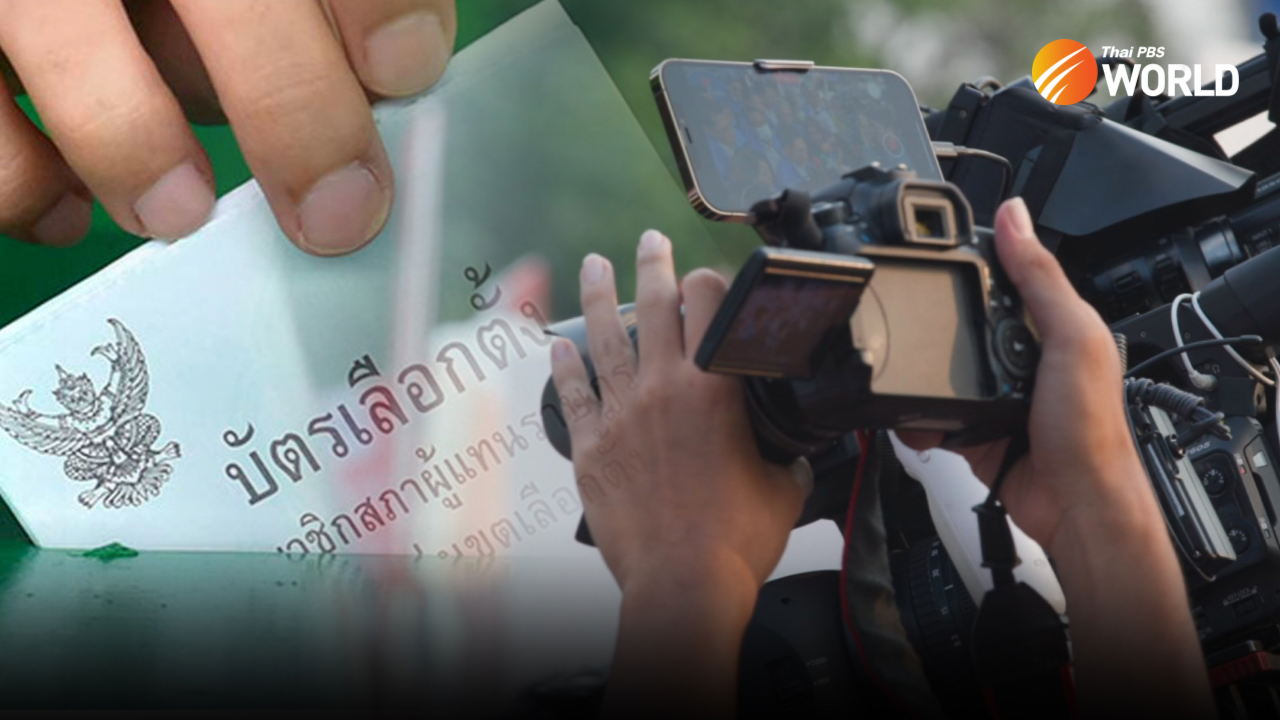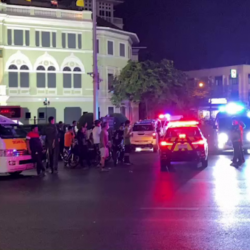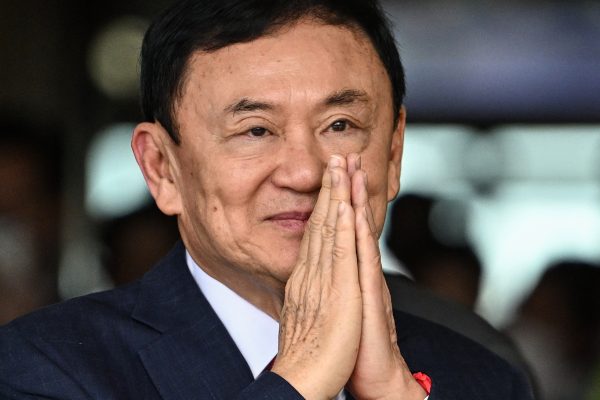Thai media’s hopes for positive change after general election

Press freedom remains a challenge in Thailand, especially when it comes to political issues. According to the 2022 World Press Freedom Index, by Reporters Without Borders, Thailand’s press is considered to be in a “difficult” situation, being ranked 115 out of 180 countries
Despite improving its ranking from the year before, the report says that the country’s media landscape is “highly polarised”, especially with Prime Minister Prayut Chan-o-cha’s vision of how the media should play a “major role” in “supporting the government’s affairs”.
It also mentioned that some lower profile media, which try to provide an alternative point of view, often end up being targeted by authorities, unlike mainstream media, which “toe the government line”.
With the May 14th general election around the corner, many Thai journalists are hoping for more press freedom in reporting political issues while demanding that authorities remain transparent with the election process, which will affect the direction of Thailand’s future.
“As journalists, sometimes we have to admit that there are restrictions in reporting on political conflicts, whether you’re reporting on the government or opposition,” said Natchanit Tiennoi, a news reporter for Workpoint TV.
“For this election, I want to see freedom of the press, where journalists can freely report political conflicts, allowing them to report the truth and the facts freely, without any oppression.”
Similarly, Anantachai Watcharasathien, a news reporter for Channel 7, also wants to see Thai journalists upholding their ethical standards, especially when reporting Thai politics, as he feels that the media has always been criticised by the public in many ways.
“I don’t want journalists to lean towards certain political parties, but they should give balance to all parties and report fairly.”
Media interference from the state
Despite the global press freedom rankings, there are still people in the industry, however, who feel that they still have some press freedom, when it comes to reporting on Thai politics.
Montri Chompan, a veteran political correspondent, who has been covering Thai politics for many decades, said he has never been restricted in reporting the facts.
“I’ve been hosting radio shows for more than 10 years, I’ve never been told that I cannot report on certain issues,” he said.
Though he feels that direct state control or interference is not as extreme as it used to be, what is of much more concern is interference from its “sponsors”.
Putting political preferences aside, some news channels are funded by business conglomerates, with some of its executives being stakeholders in the channel. This puts the media in a compromised situation, where they can be influenced to refrain from reporting certain issues.
“It’s a different way of control, as the media still needs support from its sponsors and from advertisements,” Montri stated.
Taking sides
Though being impartial in their reporting is the most important media ethic, maintaining its image for being impartial in the eyes of the public remains a complicated challenge.
Considering the polarisation of Thai politics, a number of media personalities are often criticised by the audience for taking sides.
Wannasiri Sirivarna, a senior news anchor at Thailand’s state-affiliated media MCOT, who regularly interviews politicians from various parties for her nightly talk show, is among them.
“I get judged every day,” she said, adding that people’s (mis)judgement of news anchors is inevitable.
“Maybe, because of my character, if some people see me frown [during a live interview] they assume that I dislike the person I’m interviewing. If viewers watch my talk show every day, however, they know that I’m being impartial. I never take sides.”
Regardless of the challenges, Wannasiri insists that she has never been pressured to report stories in a certain way.
“But whatever we report to the audience, we always have to remind ourselves that we are reporting as journalists. It doesn’t mean that we’re not allowed to express our opinions, to question, nor to report it. We’re not instructing the audience, but we let the audience question it with us, but we’re not allowed to defame or demean anyone.”
Meanwhile, Varavit Chimmanee, a news anchor and reporter at Nation TV, also feels that the Thai media has always been challenged by the audience about their duties as journalists.
“The audience has been nitpicking us all the time, and I think all media has been through that,” said Varavit.
“If anything goes wrong, based on the ethical standards, the audience are the ones who question us the most. I would like to say, on behalf of my friends in journalism, that everyone is straightforward in their reporting and have made positive changes, with the help of our viewers.”
Top contenders, in the eyes of the media
As the general election is approaching, polls are often referred to in the news stories, often to imply the popularity of each prime ministerial candidate and its party.
According to NIDA Poll, Pheu Thai Party’s Paetongtarn Shinawatra remains top-ranked among preferred prime ministerial candidates in many regions. Move Forward Party’s Pita Limjaroenrat is also the top choice for people in Bangkok, particularly among the younger generation. Incumbent prime minister, Prayut Chan-o-cha is, however, also among the top contenders, despite being in power for, technically, 8 years.
“What is interesting, however, is Prawit Wongsuwan, with his party expressing confidence that he will become the 30th prime minister of Thailand,” Montri gave a brief analysis on top prime ministerial candidates based on the polls.
“If we look at the polls, however, Prawit was not even in the top 10, while Palang Pracharat’s popularity is almost at the bottom of the polls.”
These polls do not accurately predict the outcome of the election. At the same time, who people see as “top contenders” often depends on the viewer’s point of view and their own political ideologies.
“If you are conservative, you might think that Prayut is the top contender,” Wannasiri explains. “But if you are on the democratic side, you might think it’s Paetongtarn, because she’s Thaksin’s daughter, or maybe Srettha, because he’s a business tycoon. The younger generation, they might think of Pita from the Move Forward Party as the top contender. I think it depends on how you perceive it, but as journalists, we cannot judge like that.”
At least there is some hope
While some voters are looking forward to casting their votes, some might feel hopeless as they see the same old faces always making political comebacks and causing the same problems, including corruption.
Saowaluck Wattanasin, a political editor at Thai PBS News, who has witnessed the twists and turns in Thai politics for over 20 years, still hopes that there will be some change after the election, but only if all Thais cast their ballots.
“Many people actually think that politics is boring. Politics hardly changes, despite an election, because there are few options, but many limitations. You might say that it’s difficult to make a decision. When it comes to casting a vote, who is a good guy? Which party should I vote for?”
When asked what their expectations are for this upcoming election, most of the reporters say that they hope that the next government will provoke positive changes.
“At least [we hope for changes to] long-standing problems in society and the local economy, because we’ve been wasting time on this over almost two decades. This is the time when people should step out of these conflicts for the better, both for the quality of life and the society in which we live,” said Montri.
“Of course I hope to see change,” said Tivaporn Thetthit, a news reporter for PPTV. “The elections should bring positive change to the country, whether it is from the old or the new government. I hope they will provide confidence and trust to the people by doing good things for the country and its people.”
“In this election we are seeing many new political parties, so I hope to see more new-generation MPs and new policies which are not there just to sell dreams to the people,” says Ratchanee Punnathai, a news reporter for TNN, who wants to see in a new chapter of Thai politics.
In order to provoke positive changes, Thai PBS’s political editor believes that a large voter turnout is a prerequisite for such changes to be visible.
“I expect that most will come out and cast their votes,” says Saowaluck, as she reveals her expectations.
“Of course, the election cannot determine the whole future or upend Thai politics. With the awakening of the people, as well as a large number of voters exercising their rights, it can be said, however, that the election results will reflect the consensus of the Thai people, as it can indicate what people want. What change do they want? What kind of politics do they want?”
Meanwhile, Wannasiri’s ultimate hope is to see full democracy, in which people can still reconcile, despite conflicting political views.
“I want to see people still living together, despite their differences. If we no longer want to be in a never-ending cycle of political turmoil, the only way out is to listen [to people who have different political views] and not treat them like enemies.”
By Nad Bunnag, Kitipat Chuensukjit and Jeerapa Boonyatus, Thai PBS World






